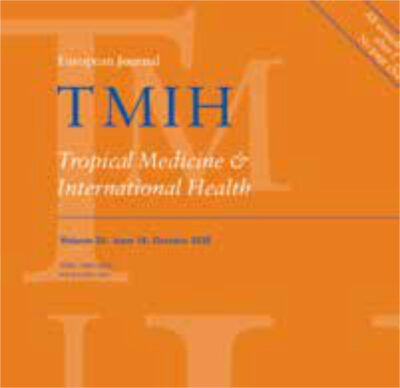Main content
Scientists in tropical medicine and global health have many options to publish their work, one of which is through the European journal Tropical Medicine & International Health (TMIH). After first presenting the history of the journal, we describe TMIH’s position in two ongoing debates: on diversity in scientific publishing and on the relevance of scientific publishing in the light of the sustainable development goals (SDGs).
History of TMIH
Revisiting the history of scientific publishing is no trivial matter. The current debate on decolonising global health requires historical grounding in order to develop forward looking thinking in addressing exclusion and exclusivity: “We are in effect still trapped in a history which we do not understand and until we understand it, we cannot be released from it.” (James Baldwin) [1]

Research on tropical medicine and international health has a long tradition in the Netherlands, originating in colonial health care in the Dutch East Indies in the mid-nineteenth century, evolving into medical development cooperation in the second half of the twentieth century, to current collaboration in international/ global health. [2] Not surprisingly, scientific publishing on tropical medicine and international health followed suit. Three main periods can be distinguished: (1) a Dutch “colonial” perspective from 1852-1942, represented by the Geneeskundig Tijdschrift voor Nederlandsch-Indië (GTNI, Medical Journal for the Dutch East Indies); (2) a Dutch perspective of “development cooperation” represented by Tropical and Geographical Medicine (TGM; 1949-1995); and (3) a European approach to international/global health, represented by TMIH (1995-present). Table 1 provides an overview of Dutch journals on tropical medicine and international health from 1850 to the present.
| In 1995 the Dutch journal TGM merged with four other European institutional journals from London, Antwerp, Basel and Hamburg [Table 2] into Tropical Medicine & International Health (TMIH) to become the official scientific journal of the Federation of European Societies of Tropical Medicine and International Health (FESTMIH – see page 15). |
TMIH is run by an editorial board, consisting of five editors, four of which represent their respective institutions and the Dutch editor representing the Stichting TMIH (foundation), the latter closely linked to the Netherlands Society for Tropical Medicine and International Health (NVTG). Over the years TMIH has maintained a good position. On the 2019 Journal Citation Reports (Clarivate Analytics), it ranks seventh among 23 tropical medicine journals and 81st among 193 public, environmental and occupational health journals. Its impact factor currently stands at 2.308.
TMIH is hosted on the internet by its publisher Wiley (previously Blackwell), which provides full-text access to all articles published since the journal’s first edition was released in 1996. The predecessor journals, GTNI and TGM, are hosted full-text and indexed by author and title on the NVTG website (nvtg.org/wat-we-doen/archief-gtni-en-tgm).
| YEAR | JOURNAL | OWNER |
|---|---|---|
| 1852-1942 | Geneeskundig Tijdschrift voor Nederlandsch-Indië (Medical Journal for the Dutch East Indies) | Vereeniging ter bevordering van geneeskundige wetenschappen in Nederlandsch-Indië (Society for the Advancement of Health Sciences in the Dutch East Indies) |
| 1942-1949 | No journal editions during Japanese occupation of Indonesia and subsequent Indonesian War of Independence. | |
| 1949-1951 | Documenta neerlandica et indonesica de morbis tropicis | |
| 1952-1957 | Documenta de medicina geographica et tropica | |
| 1957-1993 | Tropical and Geographical Medicine (TGM) | Stichting TMIH (Foundation), under auspices of the NVTG |
| 1993-1995 | Tropical and Geographical Medicine (TGM), incorporating Acta Leidensia* | Stichting TMIH (Foundation), under auspices of the NVTG and VIT |
| 1995-present | Tropical Medicine & International Health (TMIH) | Stichting TMIH (Foundation), under auspices of the NVTG, along with four European institutes. |
| INSTITUTE | PREDECESSOR JOURNAL | TMIH EDITOR (2020) | AREA OF EXPERTISE |
|---|---|---|---|
| London School of Hygiene & Tropical Medicine, London, United Kingdom | Journal of Tropical Medicine and Hygiene | Helen Fletcher* Tanya Marchant* | Tuberculosis control Biomedical science |
| Swiss Tropical and Public Health Institute, Basel, Switzerland | Acta Tropica** | Thomas Junghanss | Tropical and infectious diseases |
| Bernhard Nocht Institute for Tropical Medicine, Hamburg, Germany | Tropical Medicine and Parasitology | Christian Meyer | Infectious diseases and genetic epidemiology |
| Prince Leopold Institute of Tropical Medicine, Antwerp, Belgium | Annales de la Société Belge de Médecine Tropicale | Patrick Van der Stuyft | Social epidemiology and health systems |
| Stichting Tropical Medicine and International Health, the Netherlands | Tropical and Geographical Medicine (incorporating Acta Leidensia) Leon Bijlmakers | Global public health |
* Dual appointment.
** Since the launch of TMIH in 1995, Acta Tropica has continued to be published by Elsevier.
Diversity in scientific publishing
The diversity of scientific journals in terms of their ownership, editors, authors and readership can be defined along several domains: gender, race, country income level and geographic region. Bhaumik and Jagnoor[4] developed a Composite Editorial Board Diversity Score considering three domains: gender diversity, whereby 40-60% representation by either gender is considered optimal; country income-level diversity, whereby at least one editor from all four World Bank income classification groups being represented is considered optimal; and geographic region diversity, whereby at least one editor from six out of seven World Bank regions being represented is considered optimal. Among 27 journals analysed, three journals scored 8 points out of a maximum of 10: Globalization and Health, Journal of Global Health, and TMIH.
Nafade et al. [5] examined the composition of editors and editorial board members of twelve major global health journals, including TMIH. Across all journals, 35% (195 of 551) of editors were female, and 33% (184 of 551) were based in low- and middle-income countries (LMICS). Only 11% (61 of 551) of all editors were women based in LMICs. Only 4% of the editors with leadership roles were women from LMICs. The results of a recent (2019) study [6] showed that African researchers are under-represented as first and last author of papers from research performed in Africa. Within Africa, particularly non-Anglophone regions are even less well represented. In proposing new editors, the TMIH editorial board explicitly considers age and gender for a balanced composition. In the appointment of associate editors, geographical diversity has improved in recent years: of the 55 current associate editors 60% are affiliated with institutions from Europe, 20% from Asia, 11% from Africa, 5% from USA and 4% from Latin America.
Rees et al. [7] looked into authorship of articles published from 2006 to 2015 in four paediatric journals and showed that authorship parity (equitable representation and author order) requires more attention, particularly for publications on studies conducted in low-income countries and multi-country studies. Out of 1,243 papers, 95.9% did include at least one author affiliated with a LMIC. However, 40.4% of multi-country studies (n=165) did not include at least one author from every LMIC involved. Among the 9,876 authors of these 1,243 papers, the majority were affiliated with institutions from high-income (32.7%) or upper-middle-income countries (41.7%), with far fewer affiliated with lower-middle-income (15.5%) and low-income countries (5.4%). This indicates underrepresentation of LMIC research institutes in scientific output from international research collaboration. In articles from low-income countries, first and last authors from high-income countries were much more common than authors with low-income country affiliations.
For manuscripts to be considered for publication in TMIH, it is an absolute requirement that they include authors affiliated with institutions in the country where the research was conducted. Even in the case of internationally accessible databases as a source of data, involvement of authors from the countries concerned is considered important for the interpretation of data in their context. TMIH abstracts are available in French and Spanish (online only). As it is an Anglophone journal, authors from non-Anglophone regions are likely to be under-represented, and dissemination of scientific content outside the Anglophone world has its limits. Maintaining a truly global discourse on global issues is a challenge for TMIH and other international journals.
While open access (OA) provides access to readers free of charge, it may jeopardize access to publishing for authors from LMICs, particularly if their research projects are locally funded (with relatively small budgets), as page charges for OA manuscripts may be as high as US$ 1,000 per page. The TMIH editorial board therefore has so far maintained a mixed publication model, offering authors OA as an option.
The way forward in the debate on diversity in global health and scientific publishing
“In many ways, the growing concerns about imbalances in authorship are a tangible proxy for concerns about power asymmetries in the production (and benefits) of knowledge in global health. In fact, authorship per se is not the fundamental issue; undoing what those imbalances represent – a continuity of the colonial project in global health – is often the issue.” (Seye Abimbola, editor in chief of BMJ Global Health) [8]
Several European institutions (the London School of Hygiene & Tropical Medicine amongst others) are addressing the diversity issue under the moniker Decolonising Global Health. [9,10] This includes overt acknowledgement of past colonial behaviours and their impacts, in addition to the current hegemonic power dynamic, widely prevalent unconscious biases, and resulting inequity. The TMIH editorial board is presently grappling with these serious and complex issues.
Relevance of scientific publishing in the light of sustainable development
A systematic classification of peer-reviewed literature according to their contribution to the SDGs is currently missing. In a sample of 216 papers published in TMIH between January 2018 and July 2019, [11] the number of SDGs addressed ranged from one to eight per paper. More than a third of the papers targeted two SDGs.
TMIH took up this issue by introducing a new SDG reporting scheme. As of January 2020, TMIH adds a novel feature to original research articles, reviews and editorials. As part of the submission process, prospective authors must specify the contribution of their research to one or several of the SDGs. A simple guideline how to assign SDGs to their work has been developed for TMIH authors. [11]
Conclusion
Tropical Medicine and International Health is continuing a long tradition in scientific publishing in the Netherlands and in Europe. It has progressed from initially a platform for mainly North-South collaborative research, to a platform that increasingly includes South-South and global research initiatives. The journal has made progress in the diversification of associate editors, authors and readership and is actively participating in the decolonising global health debate. It also made an important step in monitoring and increasing the contribution of published papers to achieving the SDGs. Taken together, we hope and expect that these developments will result in a global sense of ownership by the scientific community in tropical medicine and international/global health.
Note
There is continuing debate on what (if anything) differentiates international health from the more recently coined term global health. [2,3] In this paper we use both terms, in their context, or as used in the sources quoted.
References
- Baldwin J. Collected essays. New York: Library of America; 1998
- Koplan JP, Bond TC, Merson MH, et al. Towards a common definition of global health. Lancet. 2009 Jun 6;373(9679):1993-5. DOI: 10.1016/S0140-6736(09)60332-9
- David Peters. False distinctions between international health and global health [Internet]. GHN Exclusive; 2017 Nov 2. Available from: https://www.globalhealthnow.org/2017-11/false-distinctions-between-international-health-and-global-health
- Bhaumik S, Jagnoor J. Diversity in the editorial boards of global health journals. BMJ Glob Health. 2019 Oct 18;4(5):2001909. DOI: 10.1136/bmjgh-2019-001909
- Nafade V, Sen P, Pai M. Global health journals need to address equity, diversity and inclusion. BMJ Glob Health. 2019 Oct 18;4(5):2002018. DOI: 10.1136/bmjgh-2019-002018
- Mbaye R, Gebeyehu R, Hossmann S, et al. Who is telling the story? A systematic review of authorship for infectious disease research conducted in Africa, 1980-2016. BMJ Glob Health. 2019 Oct 18;4(5):2001855. DOI: 10.1136/bmjgh-2019-001855
- Rees CA, Lukolyo H, Keating E, et al. Authorship in paediatric research conducted in low- and middle-income countries: parity or parasitism? Trop Med Int Health. 2017 Nov;22(11):1362-70. DOI: 10.1111/tmi.12966
- Abimbola S. The foreign gaze: authorship in academic global health. BMJ Glob Health. 2019 Oct 18;4(5):2001855. DOI: 10.1136/bmjgh-2019-00206
- LSHTM [Internet], London: London School of Hygiene & Tropical Medicine; 2020. Equality, diversity & inclusion [accessed 2020 Sep 21]. Available from: https://www.lshtm.ac.uk/aboutus/organisation/governance/equality-diversity-inclusion
- LSHTM [Internet], London: London School of Hygiene & Tropical Medicine; 2020. Decolonising Global Health LSHTM [accessed 2020 Sep 21]. Available from:https://www.lshtm.ac.uk/aboutus/organisation/governance/equality-diversity-inclusion/decolonising-global-health-lshtm
- Galli A, Leuenberger A, Dietler D, et al. Tropical medicine and international health and the 2030 agenda for sustainable development. Trop Med Int Health. 2020 Jan;25(1):e1-e13. DOI: 10.1111/tmi.13368



















































